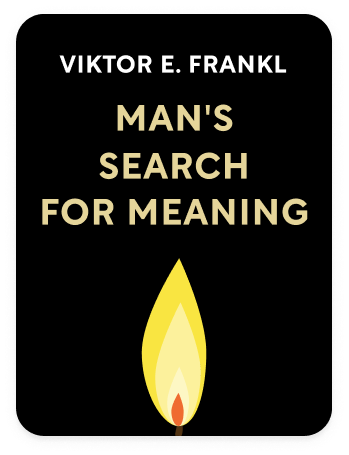

This article is an excerpt from the Shortform book guide to "Man's Search For Meaning" by Viktor E. Frankl. Shortform has the world's best summaries and analyses of books you should be reading.
Like this article? Sign up for a free trial here .
What is Viktor Frankl’s Man’s Search for Meaning about? How does Frankl explain finding the meaning in life?
In Viktor Frankl’s Man’s Search for Meaning, Frankl examines how striving for a higher purpose in life can help you build psychological strength and resistance. He bases this theory on his time in concentration camps.
Read more about Viktor Frankl, Man’s Search for Meaning, and how to find meaning in life.
Viktor Frankl: Man’s Search for Meaning
Viktor Frankl’s Man’s Search for Meaning examines his time in concentration camps, and the theories he developed. He survived 4 different concentration camps. He observed that the prisoners went through 3 general psychological phases:
- When they were admitted into the camps, most of them suffered from shock.
- Shock manifested as delusions of reprieve, and abnormal reactions to the circumstances, such as humor, morbid curiosity, and lack of fear.
- Once the prisoners became entrenched in camp life, they fell into a state of apathy.
- Apathy is the deadening of our emotional responses. This created a protective shell and allowed the prisoners to suffer intensely horrific conditions without losing their minds.
- After the prisoners were liberated, they experienced depersonalization.
- During depersonalization, you feel disconnected from your thoughts, your body, and yourself. You view yourself from the outside, or feel as if you’re dreaming and not truly present. The conditions of the camps forced the prisoners to detach from themselves, and it was difficult to repair this even after they were free.
Despite the horrifying environment, Viktor Frankl in Man’s Search for Meaning noticed that the prisoners who were more likely to survive the concentration camps had specific psychological methods of resistance: rich inner lives, future-oriented goals, and discovery of meaning in their suffering.
- Prisoners who were less likely to survive found their suffering meaningless, and eventually succumbed to hopelessness–they weren’t convinced they had any reason to try to survive, so they gave up mentally and physically.
We are all subject to external forces that can change our lives, whether they’re positive or negative forces. But the one thing we always possess, regardless of external circumstances, is our freedom to choose how we respond to our circumstances. We are in control of our perspective, our choices, and what we make of the situation we find ourselves in.
Part II: Logotherapy
Frankl survived the concentration camps, and what he witnessed in them inspired the invention of logotherapy, a school of psychology which asserts that meaning is the driving force in human life, rather than pleasure, as Sigmund Freud believed, or power, as Alfred Adler believed.
Logotherapy focuses on taking action that aligns with your meaning in life. One method of doing this is the idea of looking back on your deathbed at your choices–would you be happy with them, and would you feel they fulfilled a purpose that was important to you? Viktor Frankl’s Man’s Search for Meaning discusses logotherapy.
What Is The Meaning of Life?
Frankl says we can’t ask the question this way, as though there were one universal answer that should be satisfying to all of us. We can’t generalize what life is. The tasks of life, and consequently the meaning of life, differs for every individual–no two people experience the same life.
- Trying to ask it generally would be like trying to ask a chessmaster what’s the best chess move in the world. Any chessmaster would tell you that it depends on the particular game and the situation in that particular game–there’s no one way to win a chess game, and it depends on your choices and how your opponent reacts to them.
The meaning of life differs from person to person. More than that, every situation in your own life is unique and different from the last situation you encountered, and may require different decisions on your part to shape your fate. So we have to ask this question specific to ourselves at this specific moment: “what is the meaning of my life right now?”
Of course, when we ask “what’s the meaning of life” or “what is the meaning of my life right now,” we want an answer. But life can’t answer you. Life asks you what its meaning is, and you have to answer. We’ll discuss a few paths that can help you find meaning in the next chapter, but Frankl offers a few big-picture truths about meaning that we should keep in mind.
- There is potential meaning in every individual situation that we face in our lives, and every situation is another opportunity to choose to do things or see things in a way that is meaningful.
- A movie is made up of thousands of singular images that string together to form a whole. Each of the images has a meaning on its own, but you don’t know the meaning of the whole movie until you reach the end. But of course you can’t skip to the end and understand the movie without seeing all the thousands of images that lead up to it.
- Life is the same way: we won’t understand the meaning of our lives until we’re on our deathbeds, so we need to make sure our choices leading up to that moment culminate in a life we can be proud of.
- (Shortform example: for instance, sitting on the couch next to your partner watching TV might not seem that meaningful–but it might become super meaningful in hindsight if tomorrow you suddenly couldn’t do that anymore. Acknowledging that every moment has potential meaning for us can push us to make every moment meaningful. Maybe tonight you want to reflect on how meaningful it is just to get to relax in front of the TV with someone you care about.)
- There is meaning in our lives even when we are suffering, and we always have the freedom to choose how we handle our suffering.
- A large number of captives in the Vietnam war reported viewing their captivity as a growth experience, despite it being similar to concentration camps in the high level of suffering.
- Finding the meaning in your life is no easy task–this book wouldn’t be so popular if it was. It takes some struggle and some conflict to discover your purpose. But conflict doesn’t have to be negative–conflict, or tension, can be healthy and normal.
- Inner tension pushes us to discover answers, and is how we improve ourselves, reach goals, and accomplish things–in other words, not only is this tension inherent to our lives, but it’s actually necessary for good mental health.
- Feel the tension between what you have already achieved, and what you are able to accomplish; between what you are, and what you should become. This is a healthy tension. The meaning calls to you and waits for you to fulfill it. You shouldn’t feel that there is a final answer that will put you to rest.
- (Shortform note: Think of a pendulum–when the pendulum is in motion, two opposing points essentially pull it from one point to the other. There is tension between these two points, and the tension is necessary to keep the pendulum moving.)
- In fact, it’s dangerous to equate good mental health with perfect balance or no tension, because that’s not an achievable state. Good mental health is about how you approach or handle the tension in your life, not about removing all tension forever.
- Logotherapy refers to this constructive tension as noö-dynamics, from the Greek word noös, meaning “mind.”
Humans need to struggle to achieve worthy goals that we’ve set for ourselves and that mean something to us–this gives our life meaning. But if it were so easy to do, you’d have done it already. Viktor Frankl’s Man’s Search for Meaning discusses what meaning is and how to find it.

———End of Preview———
Like what you just read? Read the rest of the world's best book summary and analysis of Viktor E. Frankl's "Man's Search For Meaning" at Shortform .
Here's what you'll find in our full Man's Search For Meaning summary :
- How Viktor Frankl survived four Nazi death camps
- Frankl's life-changing advice for coping with suffering
- Why focusing on what you enjoy isn't enough to make your life meaningful






